Not only is a new British political divide emerging from the developing post-Brexit realignment of UK politics, but even new labels will be required to describe its opposing sides
Note: this is the updated, long-read version of the article originally published at The Conservative Woman on Friday 3rd August 2018
It was evident, even well before the 2016 EU Referendum voting pattern and its aftermath finally showed it to be redundant, that, as a method of labelling political positioning and allegiance, the traditional one-dimensional Left-Right axis was inadequate and obsolete.
As a description purely of what was long assumed to be mainly economic interest, and moreover solely derived from social class, it was poorly equipped to reflect attitudes to non-economic, cultural and social factors like civil liberties.
In contrast, and although far from perfect, the two-dimensional representation often called The Political Compass, for several years familiar to both academic and amateur students of political philosophy, displays this better.
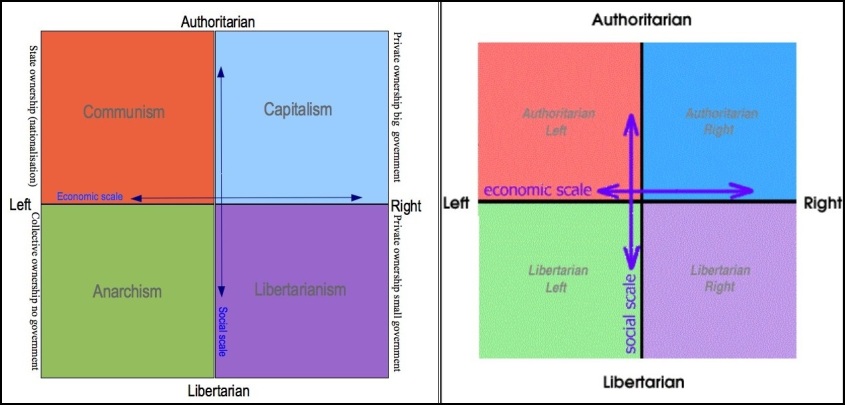
By differentiating the horizontal economic scale – running from the big-government, high-spending, high-taxing, State-interventionist, collectivist Left, to the small-state, low-tax, low-spending, private-enterprise, free-market Right – from the vertical socio-cultural Authoritarian vs Libertarian scale, it allows a more nuanced and accurate description.
Thus it’s possible to distinguish, on the Left, between Left-‘Liberal’ economic-collectivists who want state-ownership of major enterprises, heavily regulated and taxed private-enterprise, and big-spending public services financed by high taxes on private profits, but also uncontrolled mass immigration plus transgendered paedophilia for all: and semi-authoritarian social-conservatives who don’t object to a mixed economy provided the State has a near-monopoly on the delivery of major public services.
And thus it’s also possible, on the Right, to distinguish between mild social-liberals who nominally support capitalism and private-enterprise (but which very often is actually over-regulated and lobbying-susceptible crony-corporatism): and buccaneering free-marketeers who are nevertheless quite socially-illiberal on issues like, e.g., gay rights or free speech.
And, of course, libertarian-minarchists like me, in the outer 4 o’clock and 5 o’clock positions in the bottom right-hand purple ‘Libertarian’ quadrants, who, to use the old ‘boardroom vs bedroom’ analogy, think the State should:
- confine itself to the basics like defence/security/border-control, law & order and justice, and the adjudication/enforcement of contracts; and otherwise
- pretty much keep out of both boardroom and bedroom, provided that everything which happens in either is done between consenting adults, and no-one is harmed either unknowingly or involuntarily.
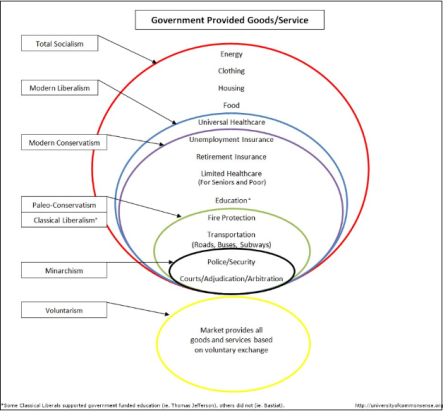
Yet even those assumptions have been shattered by the EU Referendum and its subsequent political fallout. We know that, with the exception of UKIP and the LibDems, both of whose electoral propositions were virtually defined by the EU question, the Referendum vote broke both ways across all pre-existing party allegiances and political ideologies.
People voted how they did for varying reasons, but crucially, often voted in the same way as other people with whom a political affiliation would have previously been thought impossible.
As just two examples, over 70 per cent of the mainly working-class and lower middle-class electors of Boston, Lincolnshire, voted in the same way as patrician High-Tory grandees Boris Johnson and Jacob Rees-Mogg, while inventor and entrepreneurial businessman James Dyson voted in the same way as Paul Embery, the left-ish leader of the public-services Fire Brigades Union.
This seems almost unprecedented in modern British political history. Nor, crucially, was it a temporary, Referendum-only blip. Not only has it not gone away, but it even appears to be solidifying. Politics has not, as the pundits expected and many still fervently wish, ‘reverted to normal’.
The UK appears on the cusp of a major political re-alignment, which will render prior labels redundant. The old labels and allegiances have broken down: we need fresh labels reflecting the new allegiances which are forming, coalescing around commonalities of interest hitherto unimagined.
Moreover, and contrary to the “Brexit has divided the country” meme, while the EU Referendum may have epitomised and accelerated this division, the Brexit vote per se did not, in my view, actually cause it.
The Referendum merely exposed, and for the first time allowed to be articulated, deep underlying political divisions which had been simmering away for several years among a significant segment of the population, who were in effect disenfranchised by the structural inability – or more likely unwillingness – of the consensually-centrist cartel’s political settlement to accommodate them and allow their concerns to be voiced, until the Referendum provided the opportunity.
It’s this that Matthew Goodwin, Professor of Politics at Kent University, means when he argues that the referendum result was ‘baked in’ for years before the actual vote. It’s arguably why, too, the result came as such a profound shock to the ‘Liberal’ New Class Establishment.
How, then, to summarise, in convenient label form, the nature of the new divide and its opposing tribes? Some brief illustrations of that divide’s manifestations may be a guide.
The multi-acronymed international organisations and EU-friendly big-business corporates, whose dire warnings of immediate Armageddon, in the wake even of a Leave vote, were so wrong, remain implacably opposed to the Referendum result being implemented, and are colluding with the Government in a 2018 reprise of 2016’s Project Fear.
Well-connected, but sinister lobbying interests continue to fund campaigns for what is claimed to be merely a People’s Vote (as if the one on 23rd June 2016 wasn’t!) on the final exit deal, but whose intention to turn it into a 2nd Referendum in the hope of overturning the June 2016 plebiscite are barely concealed.
Sections of the Remain-dominated media continue obsessively to pursue evidence for conspiracy theories to justify setting the 2016 result aside, seemingly impervious to the debunking and derision they rightly attract.
On one academic psephologist’s estimate, approximately 63 per cent of Parliamentary constituencies voted to leave the EU. In contrast, about 70 per cent of the 650 MPs purporting to represent them strongly favoured remaining it in, and approximately 50 per cent of them, including the Government itself are still trying to dilute Brexit to meaninglessness, or stop it altogether.
On Monday 30th and Tuesday 31st July, respectively, articles in The Guardian by the Leftist Zoe Williams, and in The Daily Telegraph by the (allegedly)-‘Conservative’ Chair of the DCMS Select Committee, Damian Collins, each demanded that the dissemination of news and opinion via social media be controlled. Both ‘Left’ and ‘Right’ agreeing, in plain sight, on both curbing free speech and restricting access for news and opinion to compliant traditional media channels no doubt deemed by the Remainer-dominated political-class to be more amenable to political persuasion or influence.
These last two are especially significant, as they seem to encapsulate what many feel to be the essence of the new divide, and are therefore a pointer to the correct new labels for its two mutually incompatible and irreconcilable protagonists – The People vs The Political Class, or in the wider context, The Establishment Elite vs The Rest Of Us.
Not that the Continuity-Remainer dominated New Class Establishment Elite aren’t dreaming up their own sets of labels, both to differentiate themselves from us, and to rationalise their referendum defeat. Three especially are particularly unpleasant, and show the largely-metropolitan ‘Liberal’-Elite’s contempt for mass democracy on full display.
‘Old vs Young’ is their first divide. The elderly so voted disproportionately for Brexit, goes this trope, so they have ‘stolen the future’ of the young, thus defining age as the new political divide. Spiked‘s Brendan O’Neill, writing in May 2017, treated this initially with the withering contempt it so richly deserves.

But, unsurprisingly, there’s more to it than that. As this chart from Lord Ashcroft’s immediately post-Referendum polling report shows, you have to get down to the 35-44 age group before the Remain vote outstrips that for Leave.
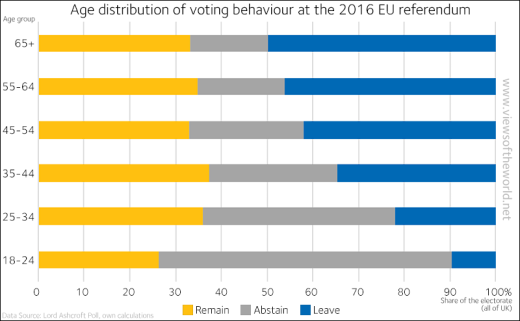
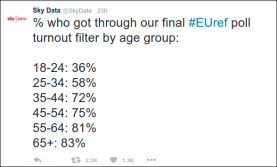 And that’s exacerbated by the figures for turnout. We know that the young, apparently so in thrall to the EU and so angry and appalled by the prospect of leaving it, actually posted the lowest turnout of all age groups. Oddly enough, to win a vote, it seems you have to, ahem, you know, vote.
And that’s exacerbated by the figures for turnout. We know that the young, apparently so in thrall to the EU and so angry and appalled by the prospect of leaving it, actually posted the lowest turnout of all age groups. Oddly enough, to win a vote, it seems you have to, ahem, you know, vote.
Next is another favourite ‘Liberal’ metropolitan’s comfort-blanket, the ‘Urban vs Rural’ divide. Now invoking a European perspective as well, this seeks to differentiate the metropolitan (allegedly)-elite from ‘pitchfork-wielding populists based in small towns and the countryside’. Quite how this copes with the fact that substantial UK metropolises like Birmingham and Sheffield voted Leave, however, isn’t immediately apparent. On one reading, the theory actually posits that urbanites are so disgusted with the voting preferences of their non-urban and rural compatriots that they are questioning democracy itself as a concept for government, another useful pointer to the correct labels needed to describe the new political boundary.
Finally, the ‘Educated vs Uneducated’ divide. On this, using purely the possession of any old university degree as the separator, the prime political split now defining the country is that between degree-holders (Remain, sophisticated, ‘educated’) and degree non-holders (Leave, barbaric, ‘uneducated’).
Apart from its inherent post hoc ergo propter hoc logical fallacy, the conflation of correlation with causation, and the potential impact as a driver for both of an Academy overwhelmingly dominated by Remain. . . .
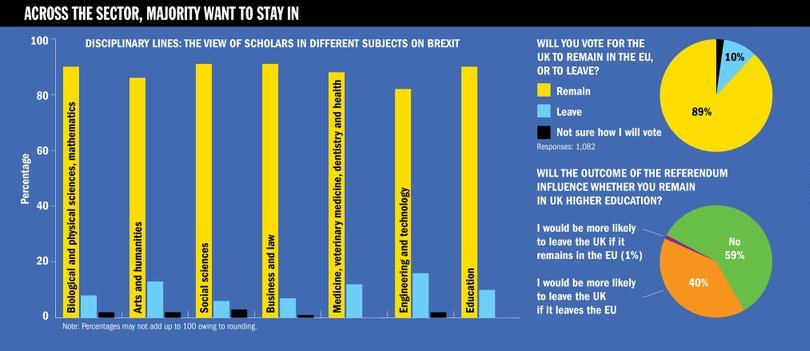 . . . .it’s a wholly specious differentiation metric. The idea, for example, that an indoctrinated 22 year-old snowflake with a 2.2 in Intersectional Gender-Studies from a third-rate ex-Polytechnic is somehow ‘educated’ and thus uniquely qualified to participate in deciding Britain’s political future, while someone in their 50’s with two or more professional qualifications and maybe twenty years at a high level in their profession but no degree is somehow ‘uneducated’ and thus isn’t, is so manifestly preposterous that it should be laughed out of Court. That it isn’t, but is actually taken seriously, speaks volumes.
. . . .it’s a wholly specious differentiation metric. The idea, for example, that an indoctrinated 22 year-old snowflake with a 2.2 in Intersectional Gender-Studies from a third-rate ex-Polytechnic is somehow ‘educated’ and thus uniquely qualified to participate in deciding Britain’s political future, while someone in their 50’s with two or more professional qualifications and maybe twenty years at a high level in their profession but no degree is somehow ‘uneducated’ and thus isn’t, is so manifestly preposterous that it should be laughed out of Court. That it isn’t, but is actually taken seriously, speaks volumes.
You might think, on this basis, that the shape of at least one side of the new political divide is clear: ‘liberal’, centrist, urban, supportive of EU freedom of movement, pro-Remain. Yet, curiously, this isn’t the case. Comparatively recently, in a YouGov survey of the policy areas and political viewpoints on which voters felt most strongly that almost all of the current main political parties did not represent them, one thing was clear. That was, as academic Matthew Goodwin has also noted, that while there may well be a demand for a new political party in Britain, it certainly doesn’t appear to be for a ‘liberal’, centrist, pro-EU, pro-immigration one.
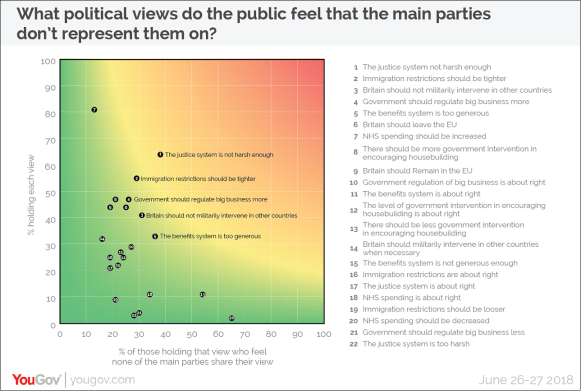
Which brings us back to the question of what labels we need, to attach to the new protagonists of Britain’s new, still-emerging political divide.
David Goodhart’s Anywheres vs Somewheres is one of the best attempts to date. If I may paraphrase some of his remarks when I heard him talking about it:
‘These people [working-class and lower middle-class Leavers] are not racist or xenophobic. The British Social Attitudes Survey shows that only about five per cent of the population, at maximum, are genuinely racist. But they do think that the level of immigration has been too high, and that while they don’t want it restricted on an ethnicity basis, they do want it, not stopped, but controlled via a democratic process in which they have a say. They want an entitlement to welfare and State benefits to be conditional and contributory, not universalist. These are not big asks, yet for ten or twenty years all the main political parties have refused to even listen to them, much less answer them.’
This stuck me then, and does now, as being pretty close, but perhaps doesn’t quite catch it. Given the Remainer Elite-Establishment’s predilection for both intolerant, illiberal, political-correctness, and its visceral aversion to mass democracy in favour of ‘enlightened’ bureaucracy (its own, naturally), then maybe ‘Authoritarians vs Libertarians’, or ‘Democrats vs Technocrats’, or something similar, will be the new political paradigm when the dust settles.
At present, the incestuous political-class & its amen-corner of media courtiers are so mired in self-referential Westminster Bubble groupthink, that they are largely insulated from this burgeoning re-alignment, and therefore either uninterested or in denial about it. They also, let’s face it, all have a vested interest in preserving the existing system which sustains them.
But there seems no doubt that somehing momentous is afoot, even if we are in its early days. The transition may be smooth and benign, but given the determination of the Elite-Establishment not to yield one iota of its hegemony, that may not be guaranteed. Major political realignments of this magnitude in an established democracy are a challenge. What Britain makes of it may set a course, for good or ill, for most of our lifetimes.
Thoroughly agree with this article? Vehemently disagree with it?
Scroll down to leave a comment
And follow A Libertarian Rebel on Twitter
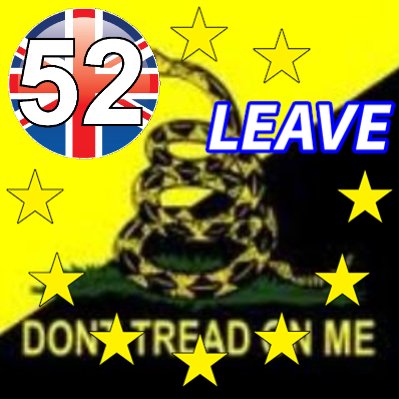
I liked your analysis very much. One thing I’ve noticed in recent years is that major political voting throughout the West has invariably turned out to be close to 50/50. Is this because politicians have missed the point or is it that the voters are no longer sure what they’re voting for? My own personal take is that we no longer like these charlatans who line their pockets at our expense – they don’t even bother to hide the fact that they are screwing us all.
>while there may well be a demand for a new political party in Britain, it certainly doesn’t appear to be for a ‘liberal’, centrist, pro-EU, pro-immigration one.
Well, the LibDems already exist!
However, a more competent centrist party would attract more support than the LimpDems. But not enough to have a chance of winning an election. The worry is more that they’d end of in a governing coalition with Corbyn Labour.